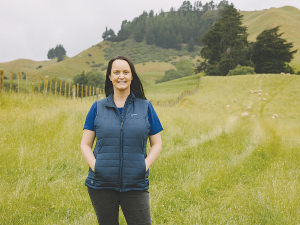Farmer confidence dips slightly, but positivity still dominates
Farmer confidence has taken a slight dip according to the final Rabobank rural confidence survey for the year.
 Emma Higgins, Rabobank, says the New Zealand ag sector will have to ride the wave of change in the coming year.
Emma Higgins, Rabobank, says the New Zealand ag sector will have to ride the wave of change in the coming year.
What will the Reserve Bank do with interest rates, when will the Chinese economy recover and will the geopolitical situation in the world get better or worse?
These are just some of the questions posed in the latest Rabobank Agricultural Outlook for 2024. It says that the New Zealand ag sector will have to ride the wave of change in the coming year, pointing to the three key areas mentioned above, all of which have implications for farmers.
The question, says one of the authors of the report, senior agricultural analyst, Emma Higgins, is will the waves of change be relatively smooth or will the sea be choppy? She says success in navigating the year will depend on people having a strategic mindset, agility and collaborating - something that NZ farmers are well practised at.
Higgins says it's likely the Reserve Bank will hold off official cash rate cuts until the second half of the year and then the cuts will be modest. She says wholesale interest rates have eased back since Christmas and are flowing through to retail, meaning good news for those with loans and mortgages.
"The second undercurrent NZ agribusiness could face in 2024 will be the Chinese market which is expected to create a challenging course for exporters.
"This is our key export market and is likely to continue to have a slow economy this year. This is due to property price pressures, weak consumer confidence, dwindling demographics, and lethargic global consumer demand for Chinese exports," she says.
Higgins says this doesn't bode well for strong commodity prices for New Zealand food and fibre export products which are heavily reliant on China.
The other major challenge for NZ agri is the geopolitical situation with wars in Ukraine, Israel and Gaza and attachs on ships trying to go to the northern hemisphere via the Suez Canal. The latter problem could see a rise in freight rates to and from NZ. On top of the conflicts, there is the looming threat or political uncertainty among some of the economic superpowers, such as the EU, the US, India and Russia, who all have elections this year. Higgins says some of our key trading partners, the UK, Korea and Indonesia, also have elections.
"Closer to home, we have the new coalition Government settling in with priorities still being decided," she says.
She says what happens with the weather in NZ will create another ripple of uncertainty. She says the message to farmers is to keep a close eye on feed supply and quality, and stocking rates heading towards winter.
"Sustainability and emission reductions will remain a key theme for the sector in the years ahead," she says.
Commodities Outlook
Emma Higgins has put out a few predictions about the outlook for individual commodities for the coming year:
Environment Southland is inviting feedback on two bylaws that play a critical role in safeguarding the region's waterways and ensuring the safety of the local community.
While the North Island is inundated with rain, Southland is facing receding water levels as warm weather and lack of rainfall continues.
Entries have opened for the 2026 Fieldays Innovation Awards.
Organisers are expecting another full field of 40 of the country’s top shearers for the popular Speed Shearing event at this year’s Southern Field Days at Waimumu.
The Southern Field Days Innovation Awards have a great record in picking winners and the winner of the 2024 event will be putting up a display to support the event at this year’s show.
A buoyant farm economy should make for a successful 2026 Southern Field Days, says chairman Steve Henderson.